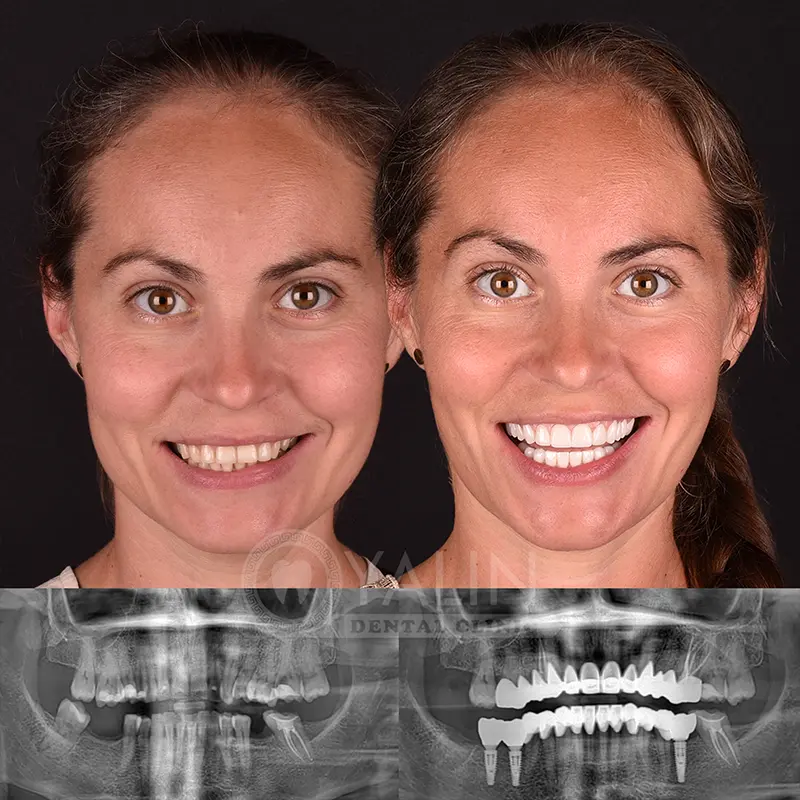
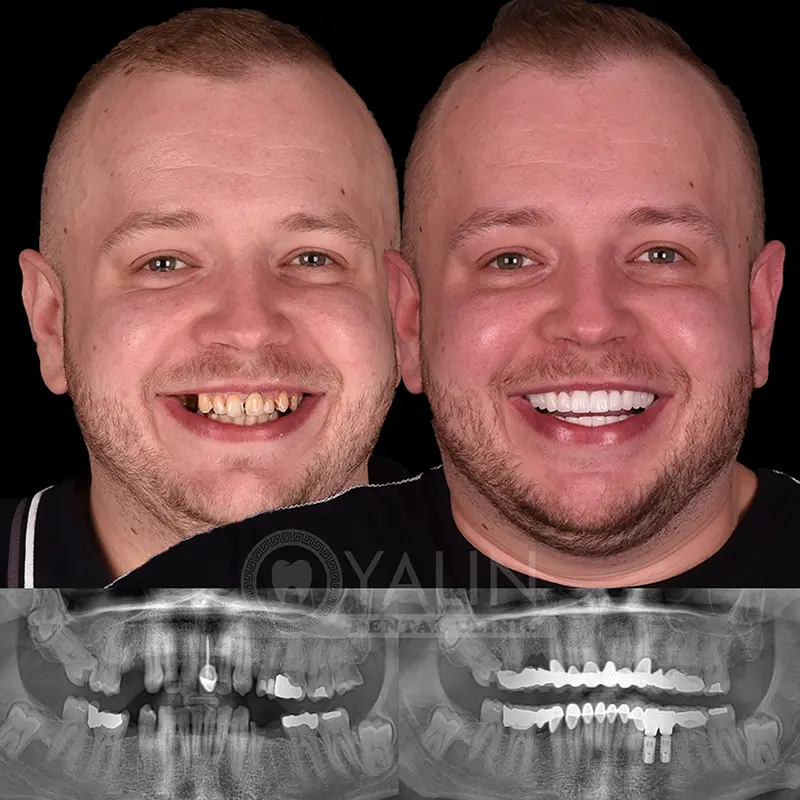
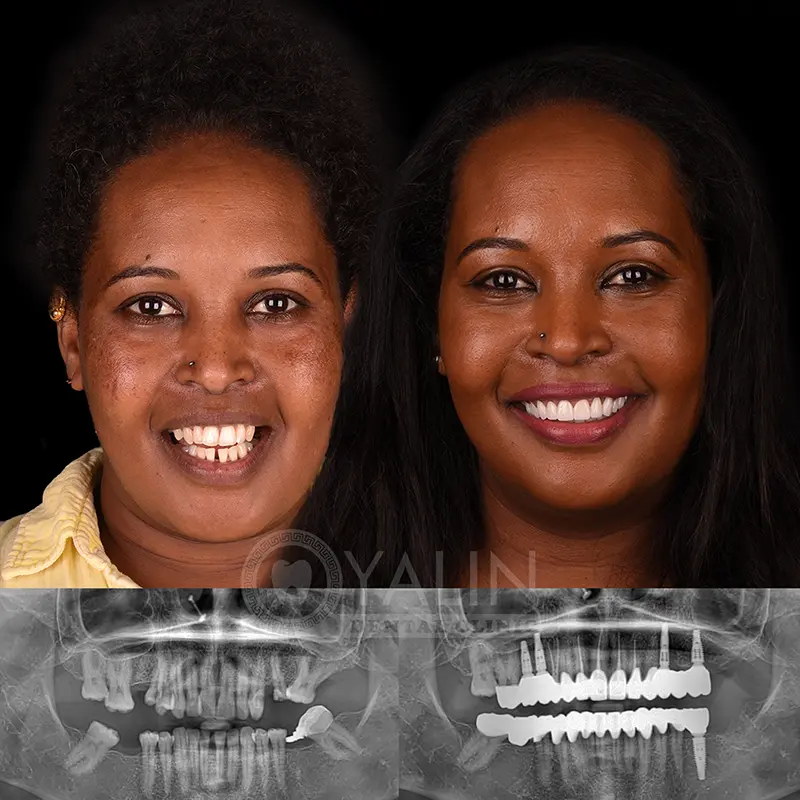
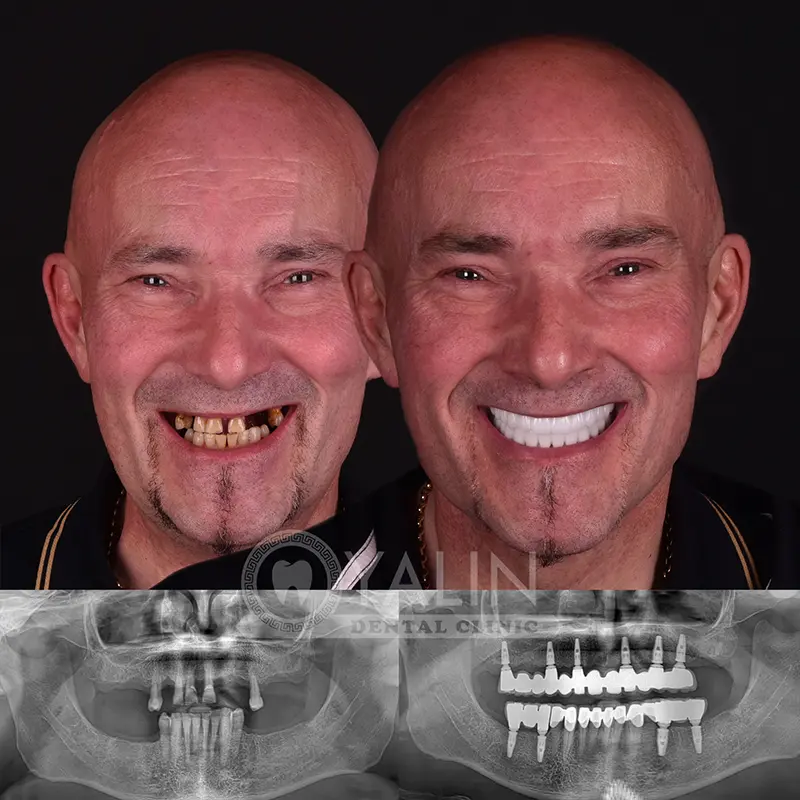
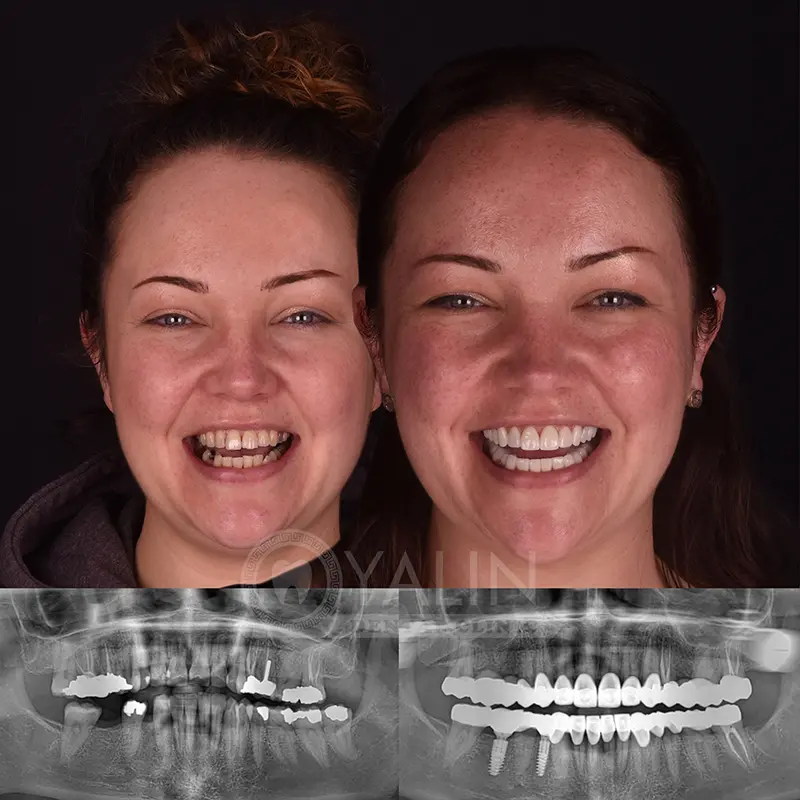
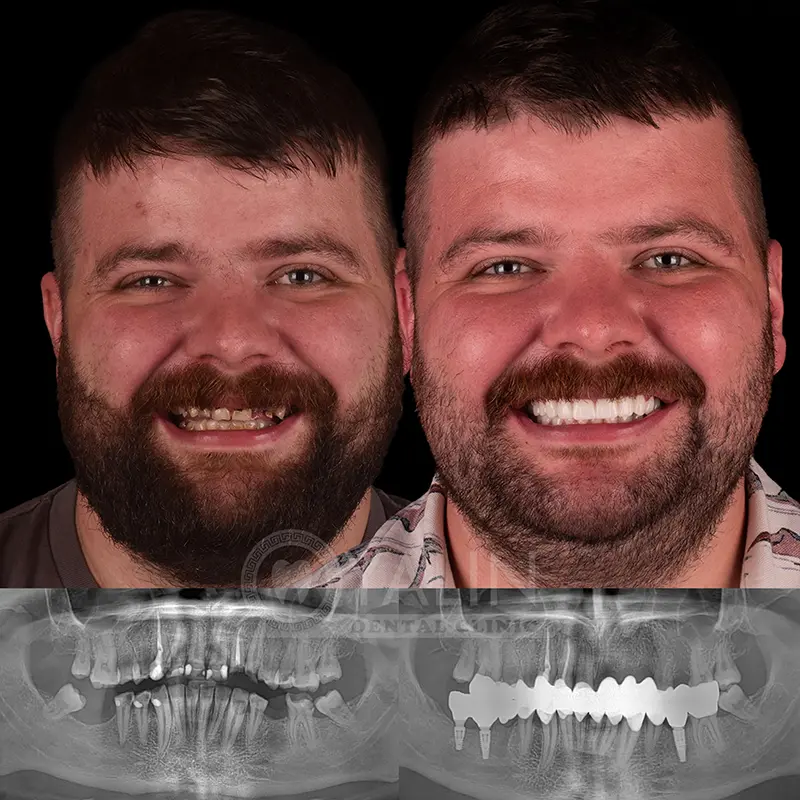
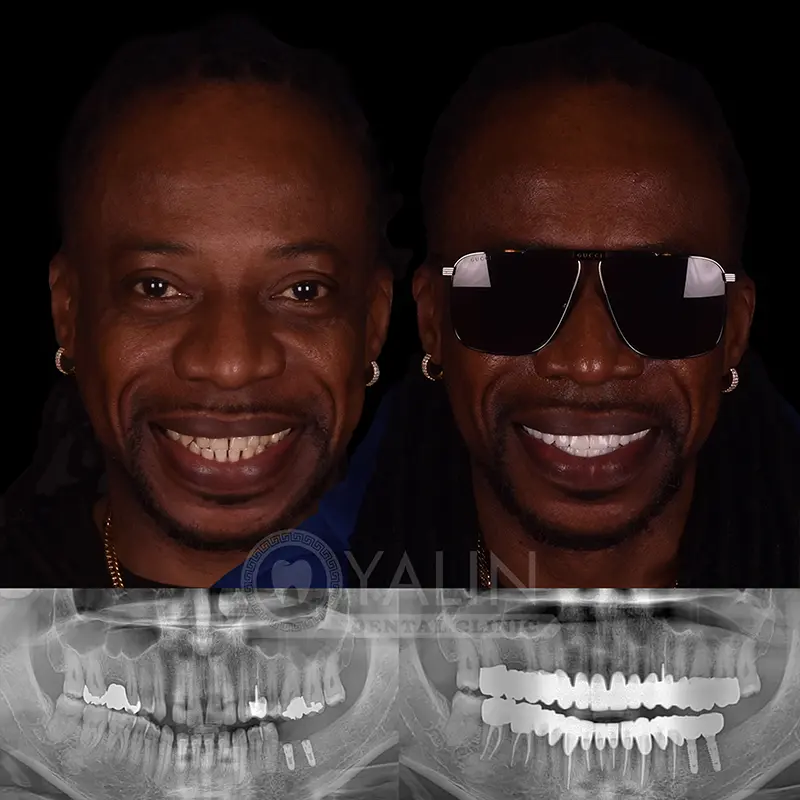
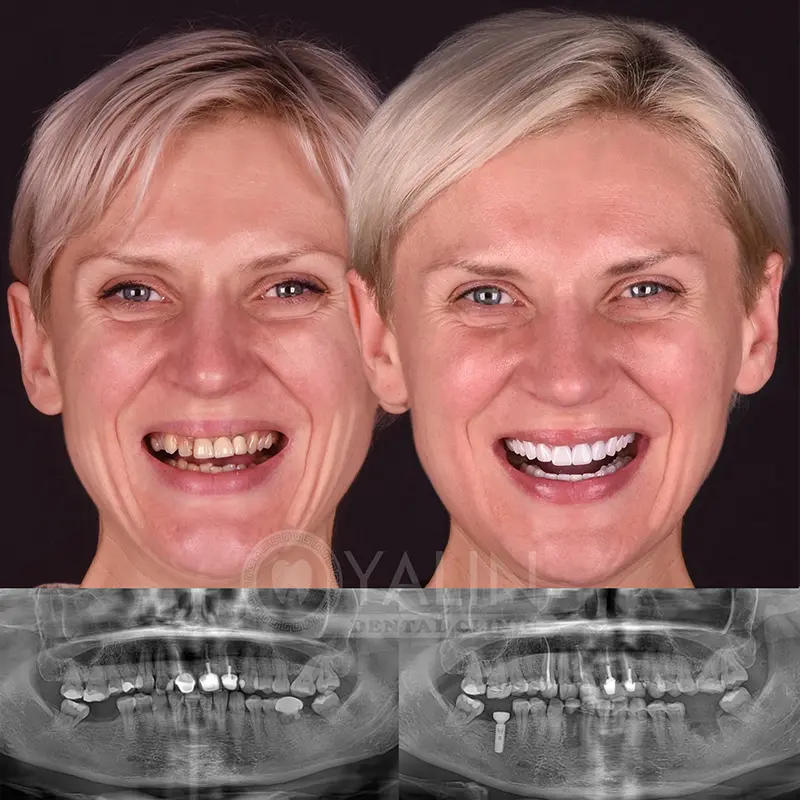
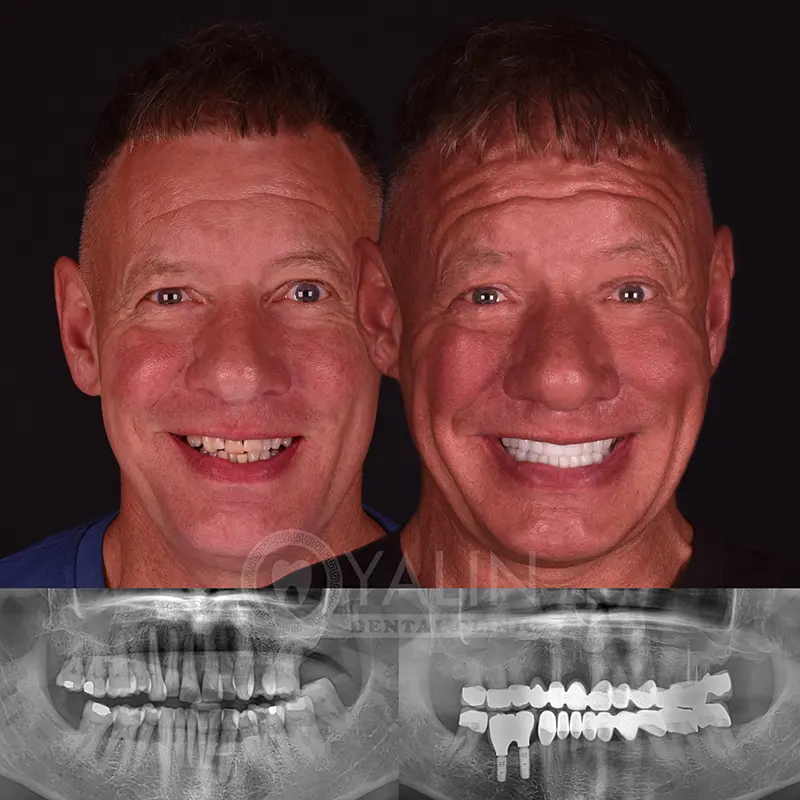
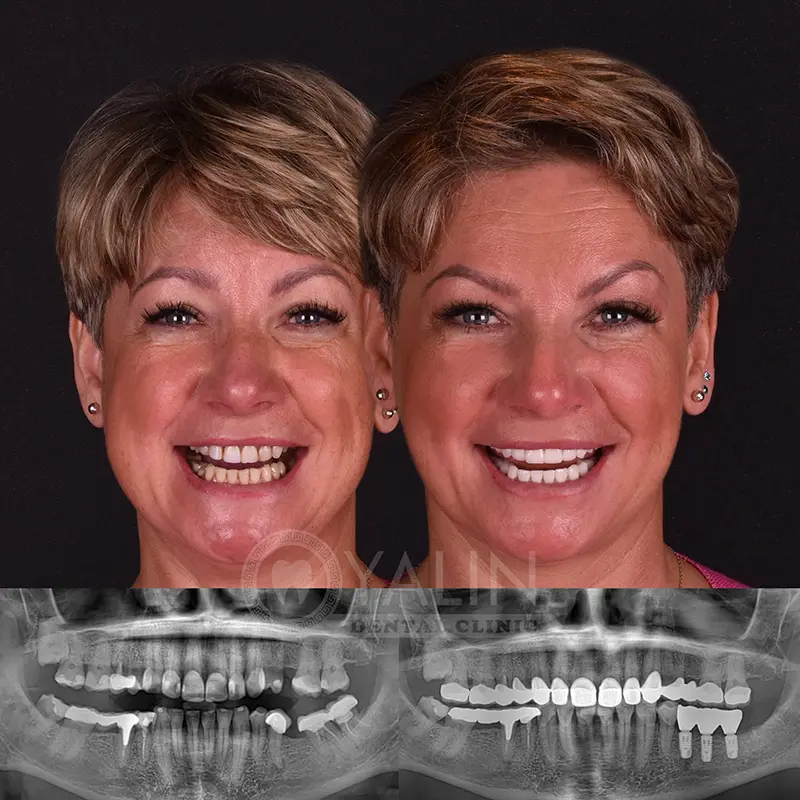
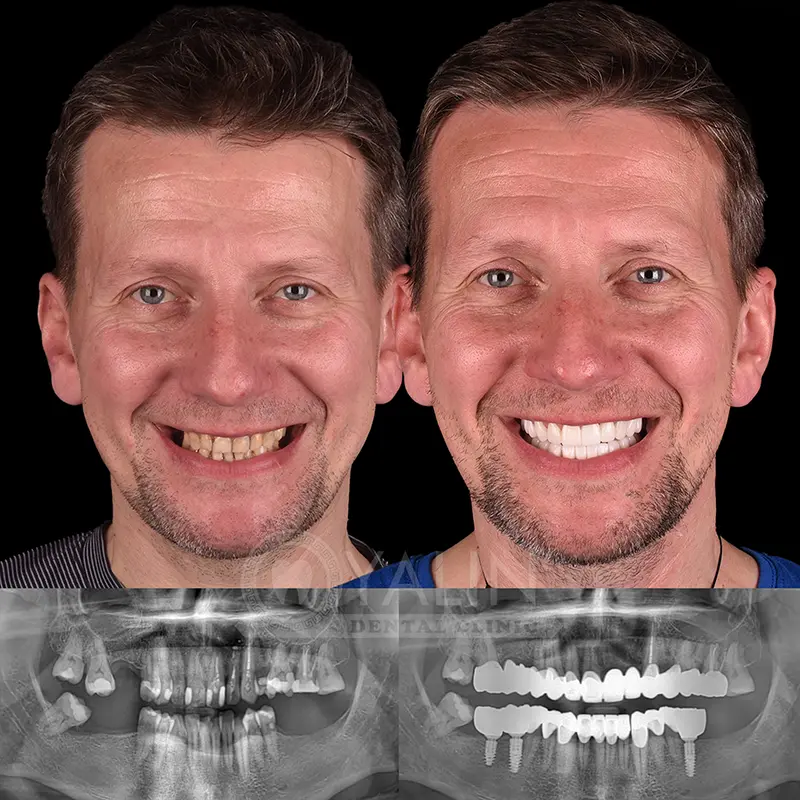
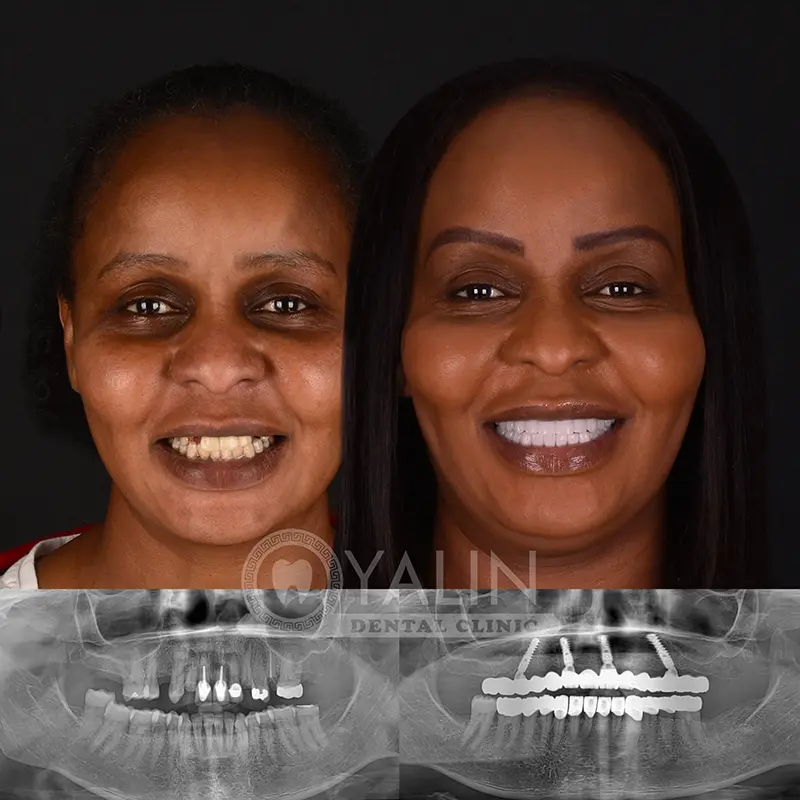
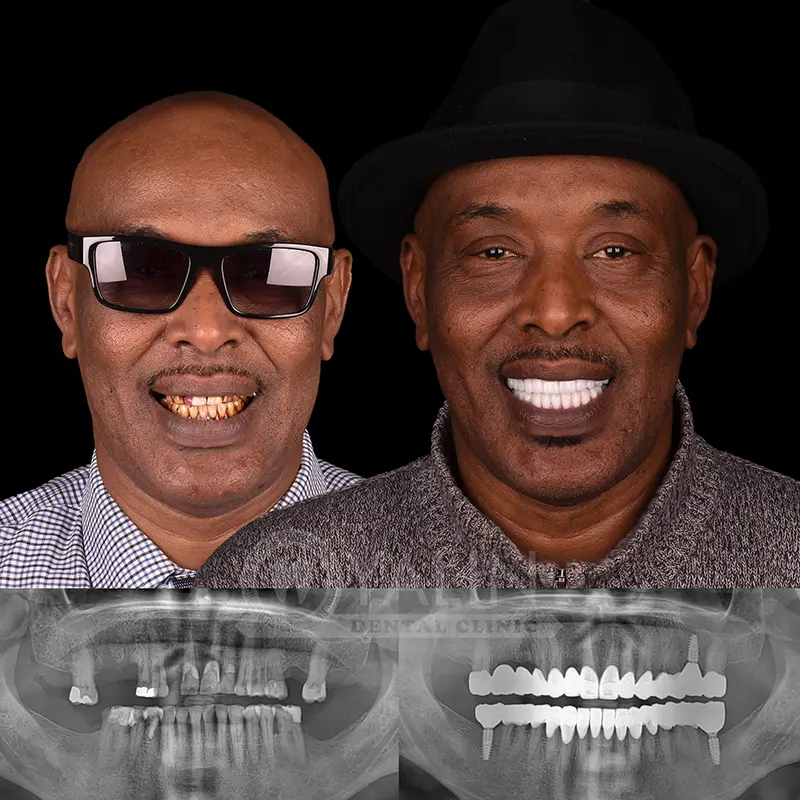
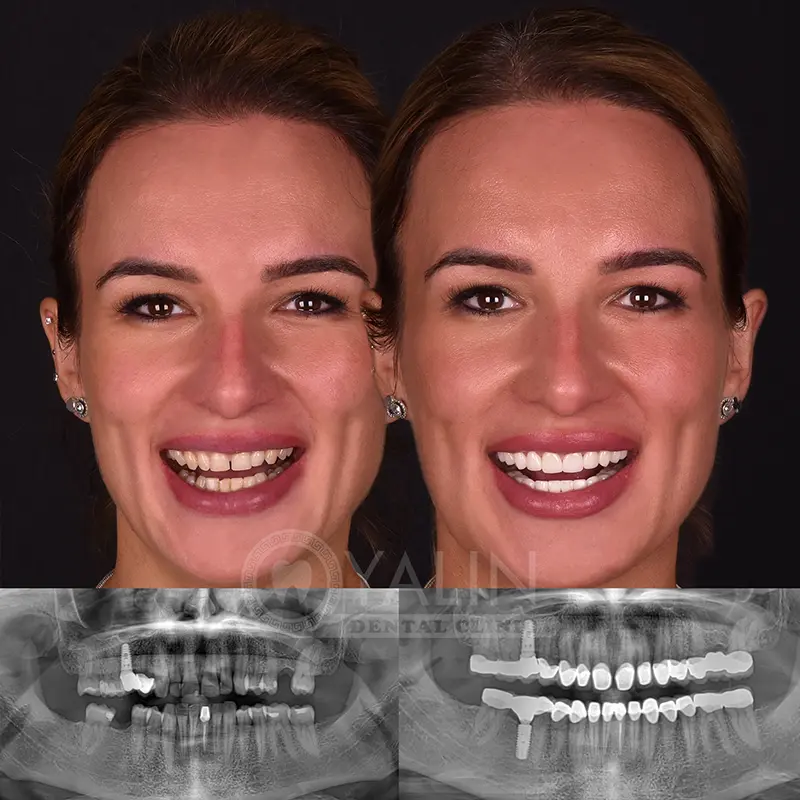
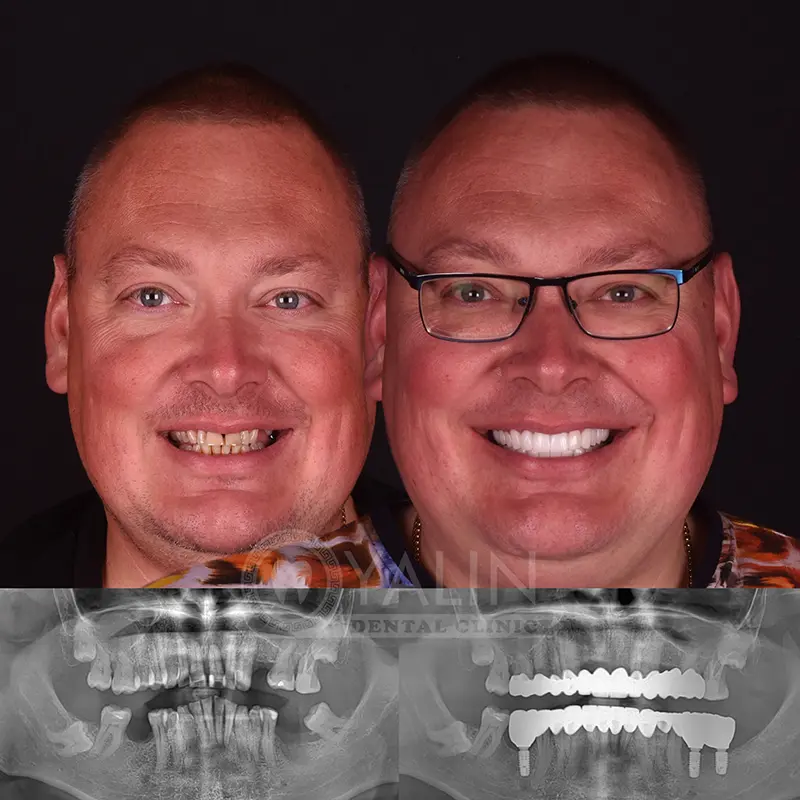
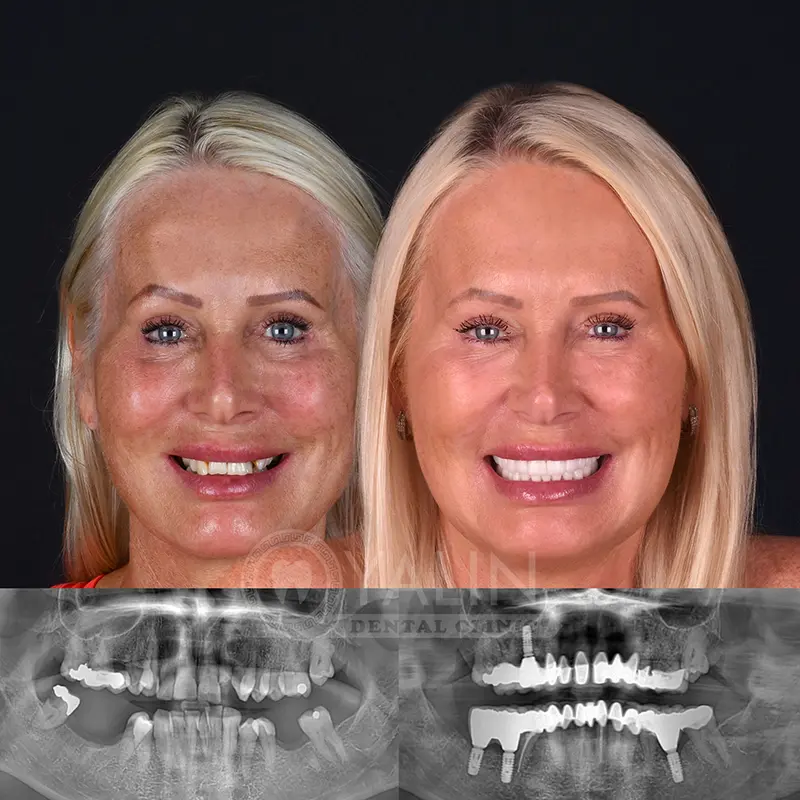
What are dental implants in Turkey?
Dental implant surgery is a procedure that replaces missing teeth with natural-looking and functional ones. The process begins with checking if your jawbone is strong enough to hold the implant, and sometimes a bone graft is needed to prepare the foundation. While performing the surgery, a titanium post is inserted into the bone, just as a firm root for a tree is being driven into the ground. When it knits with the bone, an abutment is placed, then a specially made crown is placed, and no one can tell that there was ever a problem. If maintained properly results can last a lifetime and you get a smile that looks good and feels strong.
Glance to Dental Implants
| Question | Answer |
|---|---|
| Success rate 📈 | Around 95% |
| Longevity 🕰️ | Lifetime with care |
| Procedure time ⏳ | 90 minutes; full process 6-12 months |
| Driving after 🚗 | Same day unless sedated |
| Back to work 💼 | 1-2 days |
| Anesthesia 💉 | Local |
| Surgery type 🔧 | Minor outpatient |
| Results 👀 | Visible after healing |
| Discomfort 🩹 | Minimal, managed with painkillers |
| Worth it? 😁 | Yes, highly recommended |
| Flying after ✈️ | Safe in 2-3 days |
| Warranty 🛡️ | Depends on the clinic |
Benefits of dental implants in Turkey
|
Advantage |
Details |
|
Strong and stable |
Fixed in place, no slipping like dentures |
|
Protects jawbone |
Prevents bone shrinkage and maintains health |
|
Long-lasting solution |
Can last a lifetime with proper maintenance |
|
Cavity-free |
Resistant to decay, unlike natural teeth |
|
Restores chewing power |
Enables eating all foods comfortably |
|
Supports facial shape |
Stops cheeks from sinking or sagging |
Single dental implants do more than fill gaps, they bring your smile back to life. Secured directly into the jawbone, they’re stable and natural-feeling, unlike dentures that can move around. Imagine biting into your favorite food with ease. That’s the confidence implants give.
One key benefit is jawbone protection. When a tooth is lost, the bone can shrink, but implants act like a support beam, keeping it strong and healthy. They also prevent facial sagging, maintaining your natural appearance.
Quick thought: “Do they feel real?” Yes, they look and function just like your natural teeth.
Implants also stop neighboring teeth from shifting, which helps keep your bite aligned. They restore full chewing strength, letting you enjoy all your favorite meals. Plus, they’re built to last. Some even for a lifetime with proper care. Best of all, they won’t get cavities, making them a reliable and durable solution for missing teeth.
Dental Implants Information
|
Condition |
Requirement |
|
Missing teeth |
At least one tooth is missing |
|
Damaged teeth |
Too damaged for crowns or fillings to repair |
|
Denture issues |
Struggles with loose or uncomfortable dentures |
|
Gum health |
Gums must be healthy and free of infection |
|
Bone density |
Adequate jawbone to support the implant |
|
Age |
18 years or older for a fully developed jawbone |
|
Overall health |
No serious conditions like poorly managed diabetes or severe heart disease |
Teeth implants are a good solution for any person who has a gap in their teeth and wishes to have a fixed and natural tooth. If you’ve got missing teeth, loose dentures, or teeth that are too damaged for a crown or filling, implants might be the answer.
The perfect candidate should have healthy gums and enough bone to support the implant. If the bone is not ready, do not fret; there are ways to get around this as well through techniques such as bone grafting. General health is also important because it is very hard to heal if you have uncontrolled diabetes or severe heart disease.
Quick thought: “Is age a factor?” Yes, it’s best to wait until you’re 18 or older when the jawbone has fully developed.
If you are healthy and willing to commit to the process, implants are a long-term fix that rebuilds your teeth, as well as your bone and facial tissues. It's not just about looking good, it’s about feeling confident and living comfortably!
How do you prepare for dental implants?
First of all, you should talk to your dentist openly. Tell your dentist about any health conditions or medicines you are taking including supplements. These can affect healing. The time has come for you to quit smoking and alcohol or at least take a break because it does hurt your ability to recover.
Before dental implant treatment, leave prescribed medications like painkillers. You don’t want to be rushing to the pharmacy when you should be relaxing. Don't eat 8 hours before the surgery and also do not take caffeine foods or drinks before sleeping. A full stomach can cause anesthesia complications. On the day of the surgery, dress in comfortable, slack-fitting clothing and no jewelry.
Good planning will help you to make your surgery day a success and your recovery even more successful. As with any good trip, the preparation is half the battle; preparation is vital!
The procedure starts with an assessment of the patient. The dentist goes through your medical and dental records takes a dental X-ray or a 3D scan, and talks to you about your expectations. This step is crucial to plan the implant’s exact placement, like mapping out a perfect blueprint.
In case your jawbone is not healthy enough, then you might require a bone graft. It’s like compacting the ground before laying a foundation on a building to make sure the implant is strong. On the surgery day, local anesthesia is used to ensure that you don't feel pain. This involves the dentist cutting a small opening, drilling the jawbone, and then screwing in the implant. As if it is being screwed into a piece of wood.
The implant fuses with the bone during the waiting period. When the abutment is healed, it is cemented, and impressions are made for the fabrication of a special crown. This last step perfectly matches the color of your natural teeth and gives your smile and confidence back.
Are dental implants painful?No, dental implant surgery is virtually painless. Thanks to local anesthesia, you won’t feel anything during the procedure, except maybe a bit of pressure, like pressing your finger on a table, firm but not painful. Once the anesthesia wears off, the discomfort is minor, often compared to a mild toothache or a small bruise.
Most people manage easily with over-the-counter painkillers like ibuprofen. Swelling? An ice pack does wonders, reducing swelling and pain. Sleeping with your head slightly raised also helps, you’ll feel more comfortable and recover faster.
If the pain doesn’t fade, a visit to your dentist will quickly fix things. In the end, a little discomfort is a small price for a natural-looking, secure smile that stays with you for years to come.
|
Region |
Cost range |
Description |
|
Dental implant Turkey cost |
£400 to £900 |
Affordable teeth implant cost in Turkey is preferred by many countries. You don't wait for the dental procedures. VIP services are available from the airport to the hotel. Turkish dentists are experienced and well-educated. You can also have your vacation at the same period. |
|
Dental implant UK cost |
£2000 to £4000 |
Markedly higher teeth implant price than Turkey. Patients also wait a long time for procedures. |
|
Teeth implants cost Europe |
£1500 to £3500 |
Offers good value, with dental implant prices varying significantly depending on the country and clinic. |
Contact Dt. Hüseyin Aslantürk for detailed info about dental implant surgery and current dental implant cost of Yalın Dental.
|
Aspect |
Details |
|
Expertise |
Highly skilled dentists |
|
Training |
Regular international updates |
|
Technology |
Cutting-edge, modern tools |
|
Oversight |
Ministry of Health inspections |
|
Patient outcomes |
Excellent testimonials |
|
Worth it? |
Top-tier services |
Yes, dental implant treatments in Turkey are safe.
Turkish dentists are known for their expertise, especially in dental implants. They stay ahead by regularly attending international conferences, keeping them updated on the latest advancements. It’s like having a chef who constantly learns new recipes. This increases the safety of the procedure in Turkey.
Clinics in Turkey are equipped with cutting-edge technology, ensuring safe and effective treatments. From modern tools to strict oversight by the Ministry of Health, the entire process is designed for excellent results. Ministry of Health regularly inspects hospitals and clinics. Many patients leave with smiles they couldn’t imagine before, and the positive testimonials prove it.
Briefly? Is it worth traveling to Turkey for dental care? Absolutely! With top-tier professionalism, advanced equipment, and stunning results, Turkey is a prime destination for high-quality dental services.
|
Feature |
Dental bridge |
Dental implant |
|
Support |
Adjacent teeth required |
Jawbone anchored |
|
Impact on teeth |
Affects healthy teeth |
Neighboring teeth untouched |
|
Durability |
Short-term solution |
A long-term, permanent fix |
|
Procedure time |
Quick (2 visits) |
Slow (several months) |
|
Cost |
Less expensive upfront |
Higher initial cost |
|
Functionality |
Adequate but limited |
Feels like a natural tooth |
A dental bridge is like using nearby trees to hold up a hammock, it relies on the strength of the teeth next to the gap. It’s faster, often completed in two visits, and costs less upfront. But here’s the catch: you have to trim those perfectly healthy teeth to make it work. Over time, this can weaken them, making the solution feel less ideal.
A dental implant is a completely different thing. You can think of it like planting a new tree in place of the one that was lost. The implant is a permanent replacement. Unlike a bridge, tooth implants don't touch or affect the neighboring teeth, so they leave them intact. It feels and functions like a natural tooth, giving you long-term confidence and comfort.
Does it take longer? Yes, implants need patience. The healing process can take months, but the results are worth the wait.
While implants are a bigger investment in terms of time and cost, they’re built to last and provide the best, most natural solution. Whether a bridge or an implant suits you better depends on your unique situation, so always consult your dentist to make the best choice for your smile.
|
Feature |
Dental implants |
Dentures |
|
Procedure |
One-time, durable |
Requires periodic adjustments |
|
Appearance |
Natural-looking |
Effective but less natural |
|
Care |
Normal brushing |
Regular maintenance needed |
|
Jawbone |
Requires strong jawbone |
No bone requirement |
|
Cost |
More expensive |
Budget-friendly |
|
Comfort |
Feels natural |
Adjustment period needed |
|
Longevity |
Long-term solution |
Periodic replacement needed |
The decision of whether to get dental implants or dentures is like deciding whether to buy a well-built house or rent a house. Each type is suitable in its own right, but what is more suitable to your life pattern and needs?
Dental implants are a one-time procedure. They are long-lasting, have the appearance of natural teeth, and require no extra care apart from regular brushing. They are ideal if you want something that has the feel of belonging to the oral cavity. But here’s the catch: implants are best suited for patients with a strong jaw bone and are costlier than the other two options.
Dentures on the other hand can be acquired for even less than the cost of implants. They are suitable for anyone who cannot get implants or anyone who does not want to go through the process. Yes, they do take some time to get used to especially while chewing or speaking but they do the job. The only thing you should bear in mind is that dentures need to be adjusted from time to time or changed completely in case of some changes in your mouth.
Which is better? It depends. If you are willing to spend a little more for the implant and you want to have a comfortable night's sleep then implants are the best. If you want something that will be faster and cheaper, dentures will work for you.
Last of all, it is about what is convenient for you. Both of the options mentioned above can make your smile beautiful again, so consult your dentist about what is best for you!
Yes, dental implants are worth it. Think of them as constructing a good bridge where the pillars are set and are meant to hold for a number of years. Unlike other solutions such as dentures or bridges, implants do not only replace teeth; they also hold your jawbone, thus avoiding gradual bone loss.
This is why implants have a natural look and feel. Your favorite foods taste better, you can speak fluently, and you smile without any doubts. It is like getting back the tooth you lost but it is so much better because it does not rot.
Despite the fact that they are time-consuming and expensive in the beginning, implants are worth the investment. They are not only about the looks but about the health of your teeth and your ability to live a life without concerning yourself with your teeth. In other words, they are not only a product, they are a product that makes people happy!
Yes, speaking can feel a bit awkward with dental implants at first, but it’s only temporary. After the surgery, your tongue and mouth need time to adjust to the new structure. It’s like wearing a new pair of shoes, things might feel off for a while, but soon they fit perfectly.
You might notice certain sounds or words are harder to pronounce initially. That’s normal and nothing to worry about. Just like getting used to braces or a filling, your mouth will adapt. Patience is key! Speak slowly and clearly, giving your tongue a chance to find its rhythm again.
Before you know it, you’ll be back to speaking confidently, with no one even noticing the adjustment period. Dental implants are all about long-term comfort, and the temporary hiccup is a small price for that reward!
Teeth implants have about 95% success rate. The dentist’s experience ensures precise placement, while your aftercare plays a critical role in this success.
Following advice like avoiding smoking and managing conditions are important factors for success. Neglecting advice lowers success rates, making proper hygiene and habits key.
It’s simple! When both the dentist and patient do their part, implants become a reliable, long-lasting solution for a healthy smile!
Although the timeline for dental implants varies simple cases take under an hour to place the implant, but if a bone graft is needed, it adds a few months. Healing usually takes 4 to 6 months as the implant bonds with the jawbone. Once healed, the crown is fitted, and the process is complete. In total, it can take 4 months to a year, but the lasting results make it worthwhile.
Which is better crown or implant?
|
Feature |
Crown |
Implant |
|
Condition |
Saves existing tooth |
Replaces missing tooth |
|
Procedure |
Covers and reinforces |
Titanium root and crown |
|
Durability |
Moderate lifespan |
Long-lasting solution |
|
Bone health |
No impact on bone |
Prevents bone loss |
|
Appearance |
Restores natural look |
Mimics natural tooth |
|
Suitability |
For repairable teeth |
For extracted teeth |
It all depends on your tooth’s condition and what works best for you long-term. In this case, if the tooth is not completely decayed but only the surface of the tooth is broken or decayed, your dentist may recommend a crown. You can consider it as a strong cap that is placed on a damaged building; It helps to cover, reinforce, and beautify the tooth that has already deteriorated.
If the tooth is beyond repair or has to be extracted then the only viable solution is an implant. It’s like planting a new tree, with a titanium root that integrates with your jawbone. Gradually, it fuses with your bone and acts as a root for a crown that is as real as your tooth. Furthermore, implants reduce the chances of bone deterioration, a factor most people with missing teeth are unaware of.
So, which is better? If the tooth can be saved, a crown is a much easier way to go. But if it cannot, then an implant is the solution that will remain with you for the rest of your life. Depending on your needs, the right choice is the choice that is best for you; so, ask your dentist for advice.
Yes, dental implants are natural-looking. They’re crafted to match the color, shape, and size of your teeth. So nobody will understand unless you tell your friends. The implant acts just like a real tooth root, securely fixed in your jaw, which means no slipping or shifting.
Think of it as replacing a missing puzzle piece. Once it’s in place, everything feels complete again. You can smile, eat, and talk with total confidence. With proper care, implants keep their natural look for years, making them a seamless part of your life.
Dental implants are of different types depending on the situation of the patient. The most frequent one is the endosteal implant, inserted into the jawbone as a strong screw. Thus, for patients with lesser bone density, subperiosteal implants are placed above the bone, while zygomatic implants are placed on the cheekbone. Mini dental implants help secure loose dentures while the all-on-system uses only four implants to give a patient a full set of teeth.
Showering after dental implant surgery isn’t a great idea for the first 24 hours. Your body needs time to start healing, and a hot shower can complicate things. Warm water and steam raise your blood pressure, which increases blood flow to the implant site. This can cause swelling and even disrupt the blood clot that’s protecting the area.
Think of it like planting a seed. The soil needs to settle first; too much water or disturbance can wash everything away. Similarly, the implant site needs calm conditions to heal properly. High temperatures can also increase the risk of bleeding or infection, so it’s better to wait.
Quick tip: If you must clean up, stick to a quick, lukewarm rinse from the neck down. Your implant will thank you for it! Once the healing is underway, you can enjoy your steamy showers again.
You can contactGözdem Aslantürk to get detailed information about dental implants and to be examined. You can also read all on 6
This article is for informational and advisory purposes. The recommendations of your surgeon should be a priority.
We wish you healthy day.
https://www.youtube.com/watch?v=PA4u9fSDBMI
How Long Does It Take To Do Dental Implants?






